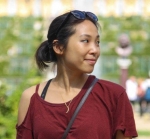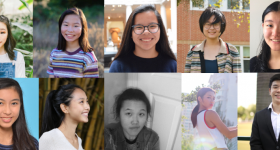For April, we bring you a story by Deborah Wei about the ways in which invisible family connections tug at individuals through generations, like ghosts that demand to be fed.
—Karissa Chen, Senior Literature Editor
A man leaves his home in the night on a ship bound for an island, knowing he will never return.
1.
Little Sister watches as Eldest Brother divides the dried fish into eight pieces. She slurps her share down with the congee, bowl to lips, chopsticks shoveling, not caring that the porridge is cold, that the bits of cabbage are soured and slimy. She stares at the bottom of her empty bowl, stomach still aching with want. She does not remember what it was like before hunger. Before the dutiful singing of the Party songs, before the streets were littered with dead sparrows, before their grand house was burned down by the local militia, before Eldest Sister found Mama swinging gently from a tree.
Second Brother takes a morsel of fish from his own bowl and places it in hers. It is chewy, briny like the sea breeze that sometimes blows in from the east. Second Brother smiles at her over his rice bowl. Little Sister sometimes wonders if their father has the same wan smile as her favorite brother, this father she has never seen. When she was little, she would look up at Second Brother and ask the same questions over and over: Why didn’t he take us with him? When will he be back? His answers were always the same: I don’t know, Little Sister. He cannot come back now, but maybe someday soon.
There is a scritching noise under the table. A shadow scampers away with a piece of fallen cabbage. The rats are getting smarter; there hasn’t been one in Eldest Brother’s traps for quite some time. The family begrudges them the scraps they steal, but the ones they can catch make tolerable meat.
That night Little Sister lies sleepless between Second Sister and Third Sister, listening to their steady breathing and the nocturnal scuffling of the rats. She struggles to recall the planes of Mama’s face, the sound of her voice singing a lullaby in the warm dark, the sweet milky smell of her skin. When Mama first died, Eldest Brother had placed her ancestral tablet on the family shrine between the tablets of their grandparents, faithfully lighting incense and making food offerings in veneration. But shrines are forbidden now and they have no rice left to spare. No wonder Mama is receding ever farther from Little Sister’s memory, following their father into the shadowland where the lost forget even as they are forgotten.
2.
The baby kicks in the woman’s belly as she stands over the wok, tossing in handfuls of sweet potato leaves. A poor man’s food, her husband will complain, but they were cheap and she has been craving them. She remembers the months after her mother died, when taro root and sweet potato leaves were the only things she knew how to cook. One night she served the greens again and her father flew into a rage, flinging his bowl at her so that a sludge of rice and vegetable matter splattered the front of her dress, then slapping her so hard her ears rang.
But this baby wants sweet potato leaves and this she must give him. With her first husband dead and one miscarriage already, this baby must live. When she looks closely in the mirror, she can see the lines already beginning at the edges of her eyes, the wattling of the skin at her neck. The apples of her cheeks, once as pale and springy as mochi, are beginning to spot and sag. She is lucky to have landed this second husband — old, a mainlander, but an accountant with a dependable income and friends in the Nationalist government. She thinks sometimes of the wife and eight children he left behind in Fujian, specters that appear in shadowy corners when she is sweeping the floor or measuring out rice. But she understands they are lost to him, that he cannot go back, that he married her so he could accept this.
The greens are wilted in the wok, and she mounds them into a pile on a large plate. As she steps out of the kitchen, she sees her husband is not at the table. On slippered feet she pads over to the small room he uses as a study and peeks through the crack in the door. He is sitting with a horsehair brush in hand, poised over a sheet of rice paper. He practices calligraphy with aggressive discipline, as if always remembering that such art is now forbidden on the mainland.
Lao gong, she says, pushing the door open. Time to eat.
Her husband does not look up from his desk as she enters. She looks over his shoulder at the elegant script, swimming up at her from somewhere perfumed and refined, somewhere she has neither seen nor knows how to imagine. He has written down a poem of the famous poet Li Bai, one she vaguely remembers reciting as a schoolchild:
Moonlight before my bed
Perhaps frost on the ground
Lift my head and see the moon
Lower my head and pine for home
Her husband puts down his brush and resettles his spectacles on his nose, sits gazing at the characters splashed over the paper. She wants to put her hand on his shoulder, bring him back to this room, to the meal she has made him, to the swollen weight of the child that she carries. But the back of her neck prickles and she does not need to turn to know they are there in the corner by the bookshelf, nine gaunt figures watching them with unblinking eyes.
3.
The fortuneteller sits shrouded in incense and the red glow of electric candles. She is a dumpling-shaped woman with a broad oily nose and a head of cropped hair, her shrewd eyes squinting at the mother and son before her. The statue of Guan Yu the warrior glares over her shoulder.
The mother, wearing false pearls and a bad coral lipstick, presents the fortuneteller with a box of pineapple cakes. The fortuneteller gestures to a pair of bamboo stools. The mother sinks down and begins weeping dramatically, begging the fortuneteller to show her eldest son the way to success in America. He is a good boy who is now the man of the family after her husband’s sudden death.
Her son fidgets beside her. He is skinny even after his mandatory military service, his squarish glasses too big for his face. He tries not to betray his embarrassment at his mother’s histrionics, struggles not to gag at the sickly sweet smell of incense.
The fortune-teller fixes a beady eye on the son as his mother laments about the three younger children who must still be fed and clothed, the little brother who has just begun university, the younger sisters not yet through secondary school. If this eldest son does not find success, then what will become of them?
All right then, the fortune-teller says and turns to the son. Give me your hands.
The fortune-teller examines the young man’s smooth palms, touches the calloused bump on the third finger of his right hand where pencils have rested in a tight grip. Scholar’s hands, steady hands.
You seem a filial boy, she says.
Most filial, the mother sobs, patting her son’s arm. The finest of my children.
And your family is pious to the ancestors? No hungry ghosts to worry about?
We sweep my parents’ graves on Yangming Mountain every year, the mother declares. Every year without fail.
The son wonders if he should mention the ancestors on his father’s side, the grandparents his father left behind. He wonders if he should mention the letters from Fujian that his mother forbade his father from answering, the ones from a half-sister who asks after his father’s health and inquires whether he will return to visit. He bites his tongue and says nothing.
The fortune-teller gives the son a talisman, a plain ring of smooth dark wood.
For protection against demons of misfortune, she explains, As long as you wear it, the benevolent spirits of your ancestors will keep you safe. Don’t take it off, and they will bring you luck in your endeavors.
He slips the ring on his finger. It is a little too snug, but his mother is already thanking the fortune-teller, promising to make regular offerings at the temple, sliding money across the table.
A week later, when he looks out the plane window at a sea of moon-illuminated clouds, he twists the band on his finger as his stomach churns. The ring feels tight and he wants to take it off, but he thinks of his family, his two sisters crying as they wave goodbye at the gate. He closes his eyes and dreams he is burning incense, bowing to a gravestone scattered with flowers and lucky red paper. There is a tug on his pant leg. A scrawny little girl with pigtails is looking up at him, a stick of incense in a grubby hand. Please, little brother. Have you brought any rice cakes for me? He shakes his head, but she tugs harder. I’m hungry, she says. I’m hungry.
When he wakes, palms sweating and heart pounding, the ring is almost painful on his heat-swollen finger. He looks out the window and can see the twinkling grid of lights below. Overhead, the pilot’s voice welcomes them to Chicago, Illinois.
4.
The young man peers at the pale substance in the bowl, its lumpy surface flecked with bits of mandarin oranges.
What is it, he asks as his wife comes into the kitchen, the baby on her hip.
Ai-ya, stop looking so suspicious. I told you it is a Jell-O salad. Mrs. Peterson gave me the recipe, so it is definitely something Americans like.
She is a good cook, her dumplings and three-cup chicken much beloved by homesick Taiwanese friends. But for an American party, they worried such dishes would not be welcome.
His wife reaches over and swipes a finger through the stuff, offers it to their chubby-cheeked daughter. The child mouths her mother’s finger and burbles.
See, baobei loves it.
The young man tickles the silky sole of the baby’s foot. Guess she really is an American.
The engineering department’s Fourth of July cookout is in full swing when they arrive. The dean’s wife accepts the proffered Jell-O salad and ushers them into the backyard. People are clustered on the patio and lawn, eating hot dogs off Styrofoam plates. The air is sweet with grill smoke and grass clippings.
The young man nurses a beer, hovering at the edge of his colleagues’ conversation. An affable associate professor has just returned from his annual family vacation.
The beaches are nice and all, but Disney World, my God. What a nightmare.
What’s bad about Disney? Isn’t it the … most happiest place on earth?
The group guffaws. He laughs along, though it had been an earnest question. He hates that he is so often unintentionally funny, the English words tainted with comedy when they fall from his mouth.
The lines, the heat … not to mention the admission fees. Now that you have a kid yourself, you better get ready for when she starts begging to go see Mickey.
The professor nods towards the young man’s wife, who is smiling as two older women coo over their daughter.
The young man tries to imagine the luxury of vacationing in Florida every year. He touches the wooden ring lodged in the flesh of his right ring finger. He remembers he needs to wire his mother’s rent money and his brother’s visa fees.
That night, he paces with the wailing baby as fireworks whistle and pop outside. As the neighborhood lapses into suburban quiet, he puts the child down in her crib. He lifts the window curtain and gazes at the inky sky. A pale coin of moon remains, invoking the lines of a Li Bai poem. Taiwan washes over him unbidden, the mossy damp after typhoon rain, the aroma of sweet potatoes over charcoal, the happy slap of many slippers on tile. He clenches his jaw against the tide, but he knows his sleep will echo with his father’s proverbs, with the voices of eight shades who call him little brother.
The young man listens to his daughter’s faint snores. She knows no country but America, this country that does not believe in ghosts. Her dreams are not yet troubled by duty or memory, by the loose threads of other lives. He tugs at the fortune-teller’s ring. It does not budge.
In the early morning, he seals an envelope on a letter he has written and rewritten for months. He double-checks the Chinese address and aligns the stamps in a neat row. The morning air is cool on his skin when he raises the red plastic flag on the mailbox.
This time, the ring slips off his finger without protest. He weighs it in his palm for a brief moment, then drops it in his pocket.
5.
But where are you really from?
The question takes her aback. She has not been asked in so long, she has come to expect Michigan to suffice. The questioner, bleached blond aunt of a friend, looks at her with lipsticked mouth parted in an expectant smile. Strains of Bing Crosby and platters of passed hors d’oeuvres swirl around them as she gropes for a response. She tightens her grip on her wine glass. Excuses herself and crosses the room without answering.
On the Metro North back to the city, the question haunts her. It was a common query growing up in her hometown, but a thorough answer seemed to confuse rather than explain. But aren’t you Chinese? Is Taiwan part of China? Unable to smooth the perplexity from an inquiring Midwestern face, she would find herself entangled, falling at last on unsatisfactory mumblings that she was Chinese American. She realizes that she does not know the answer, that she wishes now to understand.
She has spent most of her life swimming downstream as fast as possible, trying to disappear into that shining sea called America. She finds herself clutching at scraps that wisp about her head, stories from her mother, half-remembered Chinese sayings on the tip of her tongue, childhood memories of visits overseas, all of it blurring together in Taiwanese humidity.
At her parents’ over Christmas vacation, she loafs around in an old college sweatshirt, searching for fragments of truth. A wooden ring in her father’s desk drawer, one she has never seen him wear. An old picture of Ah-Gong in his study with a calligraphy brush in hand, Ah-Ma standing with a hand on his shoulder, stiffly formal. A card that arrived Par Avion from an address in Zhangzhou City, Fujian Province, thanking her father for his generous red envelope.
Back in New York, she navigates sidewalks gray with January slush to get her picture taken at the drugstore. The flash is bright, and her face in the resulting 2x2 squares is overexposed, ghoulishly pale. She squints at the photo, sees someone else staring back. The Chinese visa comes back without a picture anyway, plastered in a page between the blue covers of her passport.
***
An old woman meets her niece for the first time, and they sip tea with the shy smiles of strangers.










Comments